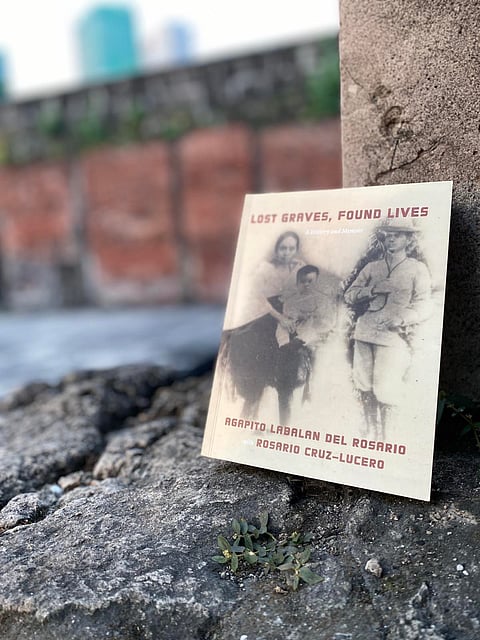
- NEWS
- the EDIT
- COMMENTARY
- BUSINESS
- LIFE
- SHOW
- ACTION
- GLOBAL GOALS
- SNAPS
- DYARYO TIRADA
- MORE

Fort Santiago — a mute witness to violence and death during Spanish colonial times, the Filipino-American War, and Japanese rule — was the setting of the launching of the book Lost Graves, Found Lives: A History and Memoir on 11 December.
Cowritten by Agapito Labalan del Rosario and Rosario Cruz-Lucero, the book looks back, in dramatic detail, on the lives of Vicente Abad Santos, Agapito Abad Santos del Rosario, Isabelo Tuazon del Rosario, and Pedro Abad Santos in the context of local and national politics, the Philippine Revolution, the Philippine-American War, and the Japanese Occupation.
Members of the Del Rosario clan were in attendance.
The book was a product of the authors' diligent collating of "previously unknown letters, memoirs, and conversations with local historians and relatives," combined with "scholarly research, the use of period publications, online resources, and other reliable secondary sources to validate the narrative."
Co-author Del Rosario is a grandson of Agapito Abad Santos del Rosario.
Excerpts from the book:
"Twenty-year-old Pedro Abad Santos left home to join the Katipunan. His best friend, eighteen-year-old Isabelo del Rosario, went with him. Pedro and Isabelo (Kapitan Bikong) fought valiantly in the revolutionary war against the Spaniards. The people's support greatly helped the Filipino revolutionaries on their way to victory against the Spaniards."
In the early months of 1901 in the Filipino-American War, Kapitan Bikong was arrested while spying behind enemy lines.
"Kapitan Bikong was in jail with other Filipino soldiers. An American jail guard, built like a gorilla, was constantly beating and shouting insults at Filipino prisoners for no apparent reason, except that, to most American soldiers, Filipinos were only 'a little better than dogs.' These fits of savage violence proved too much for Kapitan Bikong. The next time the American guard started it again, says Tatang Dan, Kapitan Bikong 'killed the burly American jail guard with his bare hands.'
"The American soldiers beat Kapitan Bikong within an inch of his life. While still nursing his wounds, he received the good news that Emilia had given birth to their second son. This boy was to be my grandfather, Agapito Abad Santos del Rosario.
"After the killing of the brutal jail guard, the abuse of Filipino prisoners in the Mexico (Pampanga) jail was reduced significantly. Kapitan Bikong's fellow prisoners looked upon him with a mixture of gratitude, admiration, but most of all, sadness, for they know that his foolhardiness — heroic though it might be — would not go unpunished by the American military.
"The Americans knew that the prisoner could use in his defense the jail guards' abusiveness, which was a well-known fact. Nevertheless, the American command sentenced Kapitan Bikong to death by hanging."
Over burgers and drinks at the book's launch, Cruz-Lucero said it could be argued that Kapitan Bikong may have been the first Filipino martyr during the war, but his name was left out of the wall commemorating the fallen in Fort Santiago.
